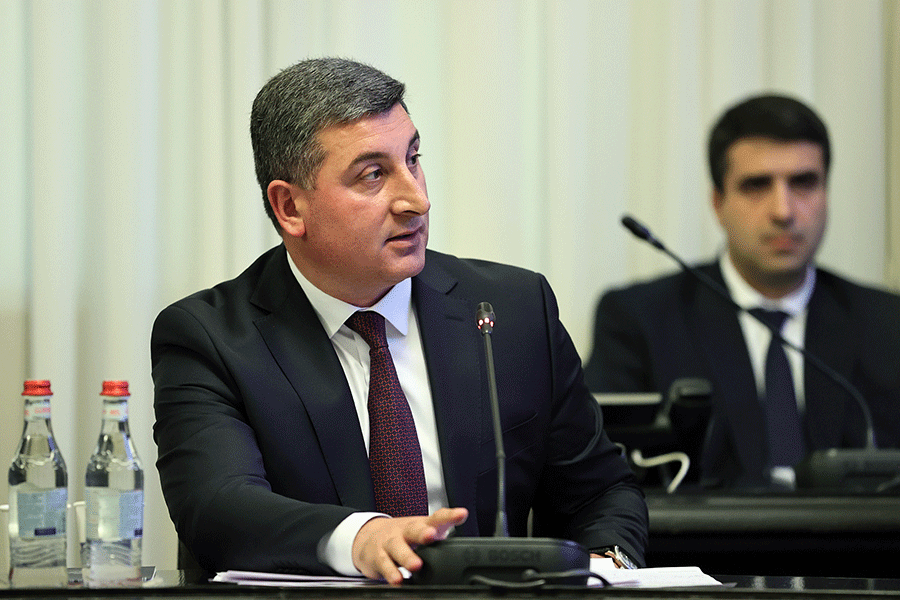A regular Cabinet meeting took place today, chaired by Prime Minister Nikol Pashinyan.
Due to the need for the development of the Institute of Authorized Economic Operators in the Republic of Armenia, the Government made an addition to one of the previously adopted decisions. As stated by the Chairman of the State Revenue Committee, Rustam Badasyan, the Authorized Economic Operator is a special status, which is given by the customs body to the business entity, if that entity is less risky in terms of customs violations.
“This status gives the entrepreneur the opportunity to use a number of simplified customs procedures. In simpler terms, the entrepreneur becomes his own customs inspector step by step and his relations with the customs authorities are reduced to a minimum,” said the SRC chairman.
According to Rustam Badasyan, at this stage, those entrepreneurs are first given the possibility to be serviced without queue. “Secondly, they will not use temporary security warehouses, that is, they can immediately take their goods to their warehouse from the border checkpoints. In the next stages, we are ready to introduce two more simplified procedures, by which the contact with the customs body will be completely absent, the businessman himself can apply seals during import and export. In addition, they can pass the border checkpoint on the condition that the declaration is submitted later and the customs fees are paid later. In this regard, the digital solution is ready and it will be implemented soon,” emphasized the SRC chairman.
Read also
He noted that the decision removes another obstacle in the process. Authorized Economic Operator can be those entrepreneurs who have the status of law-abiding taxpayers, that is, they do not have an additional tax liability exceeding 0.05 percent of the GDP. “There is still no Authorized Economic Operator in the Republic of Armenia,” said Rustam Badasyan.
Referring to the decision, Nikol Pashinyan noted that the issue has been discussed for a long time. “The issue of simplifying customs procedures in Armenia as much as possible has always been discussed. The abuse of customs procedures and related corruption risks were considered as factors hindering the normal economic activity. In these years, of course, we have paid very serious attention to the simplification of customs procedures, raising the level of courtesy of customs officials, tightening the requirements. We tried to eradicate corruption from the customs system. Of course, it’s not always that we succeeded. This is evidenced by the fact that even today we have recently revealed cases. At the same time, I must record that these cases are revealed both by the internal security services of the State Revenue Committee and the State Revenue Committee itself, and by other bodies. In general, we have developed a strategy that customs procedures should be simplified as much as possible.”
The Prime Minister emphasized the importance of the adopted decision in the context of the atmosphere of trust between a company and the government. “We say, ‘Because of this tax history, we trust you and give you the opportunity to carry out your customs procedures yourself in many cases, without enhanced and additional procedures. Naturally, this will continue as long as there are no incidents undermining that trust. The State Revenue Committee is working in the direction that not only with digitization platforms we can make inferences about the behavior of companies, but over time we should also introduce artificial intelligence as a tool so that artificial intelligence tells us that this company seems to have irregularities and additional inspection is required. I think it is right and logical that we give privilege to companies that have gained trust and a certain reputation.”
The Government adopted a decision proposing to allocate 3 billion 44 million AMD to the staffs of 9 regional administrations to compensate the government’s share of a number of subsidy programs in 2020-2023.
As noted by Minister of Territorial Administration and Infrastructure Gnel Sanosyan, the main part of the programs are for 2022: about 29 programs, and 15 programs are for 2023.
The Government made changes in the state standard of general education, the necessity of which stems from the need to revise or supplement the wording of certain provisions as a result of the introduction of the new standard in the 2-3rd, 5-6th, 7-8th and 10-11th grades of the 2021-2022 and 2022-2023 academic years in the schools in Tavush region.
As the Minister of Education, Science, Culture and Sport Zhanna Andreasyan noted, one of the important targets of the government is the substantive reform of general education, within the framework of which the new state standard of general education was already approved in February 2021 and it was piloted in the schools of Tavush Province from September 2021. “From September of this year, the standard should enter all schools of the republic in a phased version. We will start its introduction in 2nd, 5th and 7th grades. At the same time, taking into account the two-year experience of piloting the new standard, a number of changes are proposed in the standard, aimed at improving the existing processes,” Zhanna Andreasyan said.
Reacting, the Prime Minister emphasized that the results of the piloting of the standard in Tavush region are considered satisfactory and they continue to improve. The Head of the Government also added. “I am glad that we have shown enough political will to accept and implement this standard in time, despite all the complications.”
INFORMATION AND PUBLIC RELATIONS DEPARTMENT OF THE OFFICE OF THE PRIME MINISTER OF THE REPUBLIC OF ARMENIA
























































